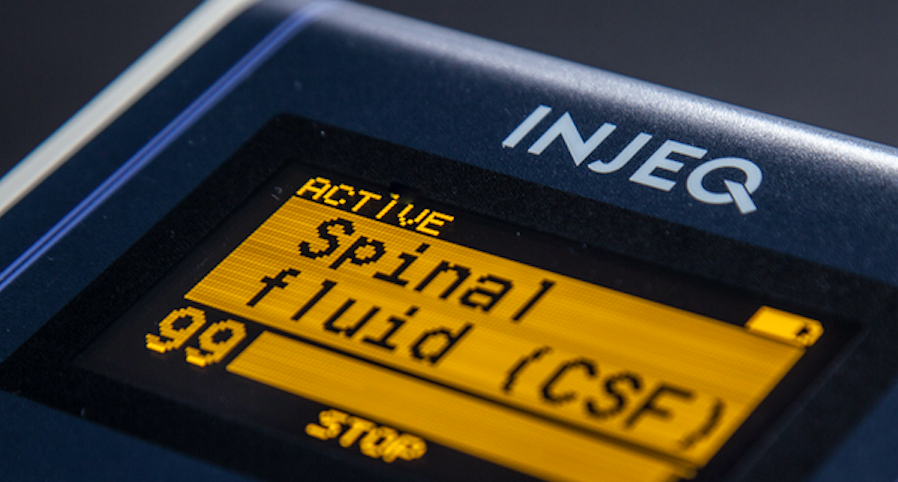Investment information
- Type:
- Equity offering
- Invested:
- €1,691,847.50
- Equity offered:
- 5.92 – 20.12 %
- Price per share :
-
€2.50
min investment 300 shares
- Number of existing shares:
- 3,176,784
- Fully diluted shares:
- 3,484,784
- Pre-money valuation:
- €7,941,960.00
Our story
Injeq Oy (Ltd) was founded when three practitioners and technology experts identified a potential solution for a known unmet medical need. The vision of Riitta, Katja, and Jari of a smart needle has since developed from an idea to a product which is ready to be introduced to the market. It will first be used at neonatal intensive care units and oncology clinics treating childhood leukemia, as the use of IQ-Tip™ needle aims to improve the safety of demanding punctures performed on their small patients.
Injeq IQ-Tip™ smart needle - For the benefit of the patient
Acute lymphoblastic leukemia (ALL) is the most common cancer type diagnosed in children. The treatment for ALL usually lasts for 30 months, during which time at least 20 lumbar punctures (also known as a spinal tap) are performed on the patient to administer chemotherapy to prevent cancer cells from spreading to the brain or spine. Each puncture is a demanding procedure, because the tip of the needle must be inserted precisely into the spinal canal. If the needle is inserted even slightly too far, it can cause bleeding. Bleeding would allow cancer cells to enter the spinal canal, lessening the patient’s chances of recovery. Therefore it is vital to know the position of the needle tip at all times.
Injeq IQ-Tip™ needle was developed for a recognized unmet need
The above example is only one of the situations where it is important to know the position of the needle tip. Three leading specialists in medicine and medical technology studied the problem in Tampere, Finland more than a decade ago when they began developing a smart needle that would solve the problem. The result is the Injeq IQ-Tip™ needle, which is now in process of being CE marked, and then launched onto the market.
Unique functionality
The operating method of the IQ-Tip™ needle is unique: The tip of the needle (a.k.a. lumen) and the supporting part inside it (a.k.a. stylet) are used during the puncture to measure the bioimpedance of the tissue touching the needle tip. A tissue analyzer unit (Injeq type 301) measures bioimpedance 200 times per second, at 15 different frequencies. This allows for differentiating the type of tissue surrounding the tip of the needle in real-time. The tissue type options contain e.g. muscle, fat, tendon, skin – or cerebrospinal fluid (CSF). In lumbar punctures, the analyzer unit emits a sound signal when the tip of the needle touches CSF, i.e. when the needle has reached the spinal canal and should not be inserted any further.
As a case example from our previous clinical investigation: Lumbar puncture on a two-day-old baby, to obtain urgently needed CSF sample, had been unsuccesfully attempted multiple times during the night with a traditional spinal needle. The procedure was finally done successfully on the first attempt with IQ-Tip™ smart needle the next morning. IQ-Tip™ needle has also been successfully used in punctures for prematurely born babies in our clinical trials. The smallest baby weighed just 1,4 kg.
More information about the technology behind the Injeq smart needle can be found at the publications section on our website.
The wide range of applications generate a huge market potential
The IQ-Tip™ is suited to a wide range of applications. For lumbar punctures, the most difficult procedures are those carried out on newborn babies and children. In this target group, the benefits of and need for a smart needle are so obvious that it is the first commercial application of the technology - to be used in the treatment of ALL-type cancer and diagnosis of meningitis. Other applications such as lumbar myeolography, lumbar punctures to support diagnosis of Alzheimer's disease, joint and vein injections, tumor biopsies for diagnosing cancer and administering anticancer drugs provide further opportunities for growth. Each application such as these is a substantial market even on its own, hence the total available market is vast.
In 2025, Injeq IQ-Tip™ smart needle will be a part of standard care
There is no product similar to Injeq IQ-Tip™ needle on the market and we have no knowledge of potential competitors who would be close to market entry. Various products with intention to help injection are being developed based e.g. on pressure sensing and light reflection. However, these technologies have their drawbacks and are still a long way from being introduced into the market. Therefore, IQ-Tip™ has an excellent opportunity to set a new standard for care procedures that involve demanding punctures and injections. The functionality of the IQ-Tip™ needle has been proven in practice. The needle is in production and ready to be launched onto the market as soon as the pivotal IQ-LP-03 clinical investigation has provided the final clinical evidence needed for the product. The company now seeks funding to complete ongoing EC-certification process in compliance with the new Medical Device Regulation (MDR) to gain EU market entry.
Why to invest in Injeq?
Injeq is a promising medtech startup with a unique solution in its possession: IQ-Tip™ smart needle which can help medical personnel to perform safer treatment for patients to whom they need to perform demanding punctures. Our goal is to help more children with leukemia to survive, less patients to suffer from traumatic and unsuccessful punctures, and in general make the lumbar puncture and later all blind and demanding punctures safer for the patients. Investment-wise we combine the search for financial returns with ethical objectives - our priority is to save patients as this is the only way to make successful business in medtech.
What has happened since the last campaign?
We have made lots of progress since summer 2017 when we closed our first campaign at Invesdor. Most importantly, we have been in EC-certification process with TÜV SÜD in Munich, Germany since April 2018. Knowing how overladen the notified bodies are at the moment in the medical device field, we can consider ourselves lucky to have been accepted by TÜV SÜD, which is definitely one of the most reputable entities in its field.
Secondly, we have kept our focus clear: getting our processes and quality system documentation eligible for EC-certification. This is a time-consuming process, to put it mildly: It does not suffice to show that our needle works, but we need to show that we are able to produce, test, store and deliver them in proper manner without any risks during the whole lifecycle of the product. Essentially, before our products can be CE marked, we need to have the manufacturing processes in place and lots of manufacturing done not only for clinical studies, but also for numerous different test and validation purposes - even though we are not allowed to sell our products yet.
At the moment, everything concerning our production is well underway: manufacturing processes, documentation, quality system, risk management and so on. We have also been lucky to find a perfect office with suitable cleanroom facilities for us - we will be moving to new premises during May-June and look forward to the possibility of showing our new premises to shareholders in connection with our Annual General Meeting this summer.
We have also recruited great new professionals, developed our future sales network, managed our patent portfolio, and many other things, but suffered a great loss when our CEO Dr. Rami Lehtinen suddenly passed away last November. We received 30 applications after we started to recruit our new CEO. Now, in May 2019 Injeq has hired a new CEO, who will start in late July 2019. The board feels that the person nominated is a perfect fit with the company.
Our business & market situation
Product and demand
The company’s first product will be IQ-Tip™ spinal needle that allows for collecting diagnostic samples of cerebrospinal fluid (CSF) and for administering intrathecal drugs into the CSF e.g. as part of leukemia treatment. These lumbar punctures are especially demanding when treating small children. Nordic pediatric hospitals in particular have expressed their interest in starting to use the product as soon as possible. Treatment of acute lymphoblastic leukemia (ALL), the most common cancer type in children, typically includes at least 20 lumbar punctures per patient. The procedure includes risks that can cause injuries and additional suffering, and make the treatment more complicated. According to an extensive Canadian study [Shaikh et al. 2014], punctures cause tissue damage in 18 percent of leukemia patients. This is directly linked to a lower survival rate: in other words, traditional needles can cause tissue damage reducing the chances of recovery.
Apart from leukemia treatments, other typical reasons for lumbar punctures include suspected meningitis, where a CSF sample is required to confirm the diagnosis. While collecting such a sample from very young patients with a traditional needle is problematic, completing the procedure with the Injeq IQ-Tip™ smart needle is easy. According to surveys [Baxter et al. 2006; Nigrovic et al. 2007; Greenberg et al. 2008; Glatstein et al. 2011], 24–40 % of punctures performed on newborn babies fail or result in tissue damage. In addition to suffering, failed punctures, consequent delays, and poor quality bloody samples cause expenses, as the intensive care of these children is unnecessarily prolonged. On the other hand, meningitis that is left untreated or is not diagnosed because of a poor-quality sample is always life-threatening. It is also among the most significant acquired causes of death of newborn and prematurely born babies.
Our product also has benefits regarding procedures carried out on adult patients. These include a reduced infection risk and less unsuccessful punctures, which improve patient safety. The aim is that once the smart needle has become an established method of lumbar puncture on child patients, it will also be taken into use in similar procedures performed on adults, as these are not easy or risk-free either.
Business model
The estimated annual market potential in European pediatric hospitals is 51 million euros. The estimate is based on patient and procedure volumes, number and types of hospitals, and expected sales prices (28 EU member states, Norway, and Switzerland). The greatest need for the product is in the treatment of childhood leukemia and also in diagnostic punctures in intensive care of newborns and prematurely born babies. These specialized fields account for around 60% of medical procedures carried out on children. The sales strategy is that the transition to using the smart needle for all lumbar punctures will be completed simultaneously throughout each individual pediatric hospital to ensure coherent operating methods.
Our total available market (TAM) can be considered to be the global combined consumption of hypodermic needles in all applications. This, naturally, would be in the region of billions of euros. As using a smart needle is unnecessary on majority of routine punctures, the serviceable available market (SAM) is naturally substantially smaller. Still, when targeting for global market in applications where IQ-Tip™ technology can provide substantial added value in the procedure, we estimate the serviceable obtainable market (SOM) to be in the region of 2 billion euros, depending on price erosion of the technology.
The sales method and pricing model will be adapted to each market. The most common model will be one-off sales of tissue analyzers. This will generate a quick income flow, while also kicking off the sales of smart needles as disposable items. Depending on the target market and the financing model, the analyzers can also be sold using a leasing contract or the needle-as-a-service model. In the latter case, the customer will be charged for the needles based on use or number of patients. The business and pricing models suited to each market and the relative prices of the components will be discussed with customers and distributor partners. The aim is that the price will not constitute a barrier to buying the products.
Sales, production, and distribution
The sale and delivery of the products require EC-certification in the EU. The company expects to receive EC-certification and EU market approval during first half of 2020. The first target market is European pediatric hospitals, where our product will enhance the precision and safety of lumbar punctures. Pediatric hospitals operate either in conjunction with university hospitals or maternity hospitals, or as individual units. In the early stages, the sales operations will focus on the leading university hospitals in particular, which will serve as references and help boost Injeq’s products as the new European standard in clinical practice.
The company’s first product IQ-Tip™ needle has been clinically tested in feasibility studies at Finnish university hospitals. While the studies showed that the product works as expected, the study design failed to comply with the new requirements. Now, our pivotal clinical investigation (IQ-LP-03) of the IQ-Tip™ system prior to EU market approval will be conducted in Tampere, Turku and Helsinki University Hospitals. Its goal is to show the clinical benefit in the form of the first puncture success rate along with the safety of the final system, ie. to provide the final clinical evidence needed for the EU market approval under the new Medical Device Regulation. The study is planned to start in August-September 2019. The study group comprises about 150 pediatric leukemia or neurological punctures. Our goal is to have the pre-market clinical studies completed by the end of this year.
Injeq Oy owns the key rights to its products. As the manufacturer of the products, the company is also responsible for their safety. The needles will be manufactured in the company’s own production facilities in Tampere using components from various manufacturers. We are relocating our facilities right now in May-June 2019. This brings us more potential to grow and robustness for future changes as the new premises will include larger production facilities and room to expand within the same building. It will be relatively easy to expand the production as the sale volumes increase. The sterilization will be carried out by a specialized European operator. The analyzer manufacture will be procured from a Nordic contract manufacturer.
Sales will be based on local distributors, with preference of local companies with existing customer relations with pediatric hospitals. Injeq has identified around 450 distributor candidates globally, and from that list distributors in Europe have been selected. The distributorship contract has been signed in three countries and agreed in five more countries. Our aim is to have European distributorships completed when we are able to start selling and shipping the products. The distributors selected so far prove that the basis on which we have built our selection is right and our candidate list is valid. Domestically initial plan is that the company will use its own organization to manage the sales in Finland, and also co-operate with Nordic university hospitals, as well as to provide support to its distributors. Negotiations have been underway with the leading Nordic university hospitals. The clinical co-operation with various hospitals in the past years has provided an excellent foundation for starting the sales operations.
Competition
Spinal needles designed for lumbar punctures are used widely all over the world. Lumbar puncture has been used in medicine for over a century. Today, around 100 million lumbar punctures are performed on patients every year. The present practice is both a competitive constraint and an opportunity. Injeq opportunity arise from the commonness of the procedure and from the problems and risks inherent to the present method. These problems and risks can be mitigated by the use of the Injeq IQ-Tip™ needle. The competitive constraint, on the other hand, derives from the view of medical professionals that the present method is sufficiently efficient. However, pediatricians are not satisfied with the present solutions, because a lumbar puncture is a demanding procedure especially when performed on children and also the risks are higher than in case of adults. For this reason, the company will start by focusing on their needs, as we find it likely that the use of the smart needle will spread at a later stage and become a standard method also in procedures performed on adults.
There is no existing market segment for a smart lumbar needle, as no similar products can be found on the market. Therefore, we foresee that Injeq will become the technology leader. The established needle manufacturers know our company, and are keenly monitoring its development. There is a good reason for this, as the company’s vision is to revolutionize the present treatment practice. This may be reflected in the profitability of at least some of the current needle manufacturers. As we get closer to our goal, we foresee the demand of the traditional needles disappearing, one hospital ward at a time. On the other hand, there is room on the global market for partnerships with conventional needle manufacturers. This would give us access to their logistics as well as their sales and distribution channels.
Problems inherent to lumbar punctures are widely recognized. Attempts have been made to develop competitive solutions based e.g. on measuring the pressure on the needle tip, or the light reflected from the tip. However, the technologies based on pressure are impractical for wider use and the light-based solutions have not yet reached the commercialization phase. All in all, according to our analysis, it can be stated that there are no competing products on the market with corresponding functionality, and that the development and commercialization of such competing products is far behind Injeq.
Requirements of the customers and the authorities
Development of new medical devices is not easy but once on the market, they often acquire a stable market position. Regulatory approvals required for medical devices are a key barrier to sales operations. An already highly regulated industry is now getting greater demands from 2020. The EU regulatory framework goes from directives (MDD) to regulations (MDR) and becomes directly applicable affecting legislation in all member states. The transition period from Medical Device Directive to Medical Device Regulation will end in May 2020. The transition itself means that the certification process becomes more demanding. Only two notified bodies (TÜV SÜD alongside BSI UK) has so far been cleared for MDR compliance, and many will cease auditing Class 3 devices as they consider it too demanding task in MDR domain. Potential Brexit will not help the situation either, as roughly 30% of regulatory resources are based in the UK. All this may lead to substantial queues for clients of the European notified bodies.
Luckily, Injeq has manufactured devices for research use that have met the European requirements for years and has been in process for EC-certification with TÜV SÜD since April 2018. We will be moving our production to production-scale facilities during 2Q2019 implementing a required quality system from the start. As the final clinical evidence is provided by IQ-LP-03 clinical investigation, which is planned to be completed in 4Q2019, we should be able to complete the tests and audits required by European regulatory practices. After the EU market approval, the company will seek for further approvals in other geographical areas in due course.
Sustainable competitive advantage
The company’s products cannot easily be copied by competitors. The product entity includes a tissue analyzer, disposable needles, and a cable that connects the two. Neither the needle nor the analyzer can be easily copied or replaced. To protect its rights, the company has either acquired or applied for patents on four different technologies. While these patents protect the company’s business operations to a certain extent, also non-patentable information collected through research and clinical trials contribute to the sustainable competitive advantage. Competitors must complete corresponding clinical trials, giving Injeq a clear head start on the market.
The company’s tissue identification algorithms are proprietary and confidential. New tissue identification measuring data is collected when the products are used. This facilitates continuous development of the products and the optimization of the algorithms. The company’s goal is that Injeq smart needle will become the most popular treatment practice in the field.
Growth paths
The company’s first market will cover pediatric lumbar punctures performed at European hospitals, especially in the treatment of acute lymphoblastic leukemia (ALL). Success on this market is a central goal and main focus of the company. Preparatory operations to establish distributors and sales have already been started in Europe and first distributor agreements signed. As soon as the EC-certification is obtained our aim is to quickly expand operations to cover the countries acknowledging the EC-certification. This provides Injeq substantial initial market potential.
When this primary beachhead is secured, there are several further growth path options. Investments in these will be considered case-specifically. The main growth path options identified are as follows:
- Lumbar punctures of adult patients. Focusing on limited-size segment with high importance such as pediatric care is a sensible way to enter the market. Still, lumbar punctures and spinal anesthesia are performed more often to adults than children. For example cerebrospinal fluid (CSF) biomarkers are increasingly being used to support a diagnosis of Alzheimer's disease [Paterson et al. 2018]. Population aging and increased prevalence of Alzheimer's disease increase the amount of diagnostic lumbar punctures used to support diagnosis of the disease. As soon as proper foothold in pediatric market has been established and the technology proven in the eyes of the practitioners, the aim is to use pediatric wards as references and to emphasize the benefits of the technology and the reduced risks in order to extend operations from pediatric wards to adult wards. Once the barriers are crossed and IQ-Tip™ approach accepted, the transition is relatively easy: From company perspective, no new devices or distributors are needed, and no new skills are needed from the practitioners. The company expects that, given time, the smart needle will become part of normal diagnosis and treatment practices, as the ease and enhanced safety facilitated by digital technology are valued highly. The smart needle can be used in training of new medical professionals as well.
- Applying for FDA approval and extending sales to the United States. The application process may be initiated after the EU market approval has been granted for the IQ-Tip™ product. The United States offers significant opportunities.
- Leveraging EC-certification to sales in other parts of the world. Investments to the wellbeing of children are a growth area also outside Europe and the United States. The European EC-certification serves as a basis for the approval process of many countries outside Europe, and relatively few official requirements are made in addition to it. Pursuing further certifications and enlarging sales network to new areas will be considered once the EC-certification has been granted.
- New applications for the IQ-Tip™. In addition to lumbar punctures, IQ-Tip™ technology can be used in many other demanding punctures such as joint and vein injections, biopsy, veterinary medicine and so on. The company will investigate these opportunities and revisit the work already done in these application areas as soon as the first application has entered the market.
Sketched estimate for revenue growth:
Our team
The importance of health technology has grown year to year in Finland into a state where health technology is now one of the fastest growing tech export sectors in this technology-savvy Nordic country [Healthtech Finland export statistics]. Injeq is based in Tampere, where cooperation of Tampere University, Tampere University of Applied Sciences and University Hospital has built an ecosystem of companies and research during the past decades. This means that there is both availability of professionals and also competition for the best resources.
From this starting point Injeq has been able to summon together a great team of professionals. Our staff of ten consists of professionals who have expertise in a wide range of fields including medical and clinical research, European regulation, signal processing and various areas of production, quality assurance, and corporate management. The company has an active board that includes the original developers of the innovation and expert members from outside the company. The board is further supplemented by outside advisors who want to see IQ-Tip™ make its way to success.

Board professional with over 30 years of experience of entrepreneurship. D.Sc. (Tech.) with dissertation on growth company process. As the chairman his role has included leading the strategic planning, business development and financing of the company. In the role of Interim CEO he has been responsible for general management.

M.Sc. (Industrial Engineering and Management) with over 20 years of experience in innovative high-technology products. Responsible of operations and R&D in a wide sense typical for a startup.
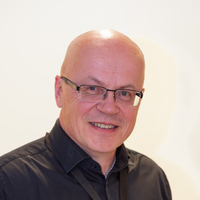
D.Sc. and Adjunct Professor (Biomed. Eng.). Over 30 years of experience in clinical science and application of medical devices. More than 310 peer-reviewed scientific publications. Responsible of clinical studies.

M.Sc. (Production Technology) with 20 years of industrial experience. Responsible for production, including development of production processes and facilities.

M.Sc. with 20+ years of experience in quality systems and med/pharma industries.

Senior sales professional with 30+ years of experience from international technology sales. Responsible for developing our sales channel and commercial partnerships.

PhD (Technology) and professor of medical technology. 30 years of experience in research and education on medical devices and medical technology, and over 15 years of management experience in research and international organizations.

Prof, MD, DDS, PhD, FEBOMS (Fellow of European Board of Oral and Maxillofacial Surgery), PhD Tech (h.c.), Specialist in Oral and Maxillofacial Surgery (med & dent). Over 30 years of experience in clinical work, research and entrepreneurship.
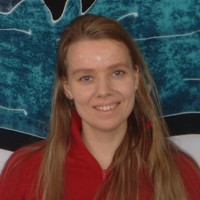
DDS and M.Sc. (Tech.). Specialist in Prosthodontics. Innovator of the original smart needle.

M.Sc. (Tech.). CEO of medical device manufacturer Atrotech.

MD, PhD. (Medicine and Surgery). Theoretical and practical knowledge in medical practice combined with relevant networks.
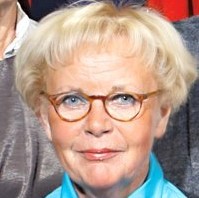
Prof. em. Anaesthesia. Vast theoretical knowledge and practical experience in needles and blind punctures.

M.Sc., Lic. Sc. (Tech.). Senior Advisor, Regulatory Affairs. Development Manager, Tampere University Hospital RDI center. Author of "The Survival Guide to EU Medical Device Regulations".
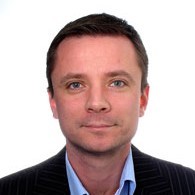
M.Sc. (Econ.). Seasoned venture capital professional and business analyst. Representative of ERDF Investment Fund.
